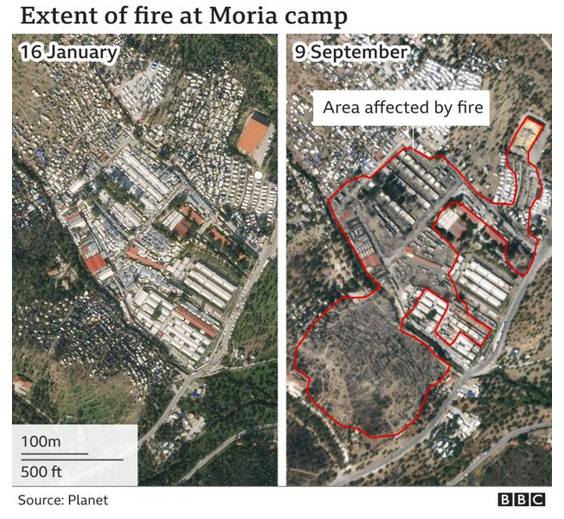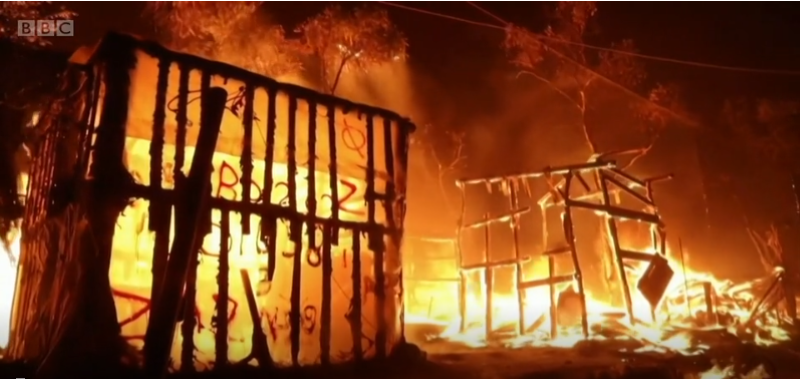Germany says 10 European countries have agreed to take 400 unaccompanied minors who fled Greece's largest migrant camp when it was gutted by fire.
In a press conference on Friday, Interior Minister Horst Seehofer said most would go to Germany and France.
Close to 13,000 people had been living in squalor in the Moria camp on Lesbos.
Families have been sleeping in fields and on roads after fleeing the blaze on Wednesday, as authorities struggle to find them accommodation.
Near the ruins of Moria local residents blocked roads to stop charities from delivering aid and said they were against the construction of new tents.
After visiting Moria, European Commission Vice-President Margaritis Schinas announced that the devastated camp would be replaced by a modern facility on the same site.
The Greek government has sent a team to Lesbos to find a solution locally, but residents oppose plans for a new camp.
"Now is the time to shut down Moria for good," Vangelis Violatzis, a local municipal leader, told AFP.
How to deal with the mass arrivals of migrants, mainly to Italy and Greece, has divided the EU for years.
Italy and Greece have accused wealthier northern countries of failing to do more, while a number of central and eastern nations are openly resistant to the idea of taking in a quota of migrants.
What's been agreed?
Mr Seehofer said France and Germany would each accept between 100 and 150 of the children.
The Netherlands has already pledged to accept 50 and Finland will take 11. Talks are ongoing with other states to take part, Mr Seehofer said.
Other countries expected to take in children include Switzerland, Belgium, Croatia, Slovenia, Luxembourg and Portugal, according to German reports.
The fire at Moria was "a sharp reminder to all of us for what we need to change in Europe", the interior minister said.
But a group of charities and NGOs have written to the German government saying more has to be done for all of the migrants, not just those minors.
"The shameful situation in the camp and the fire disaster are the direct result of a failed European refugee policy - now the EU must finally help the people affected," the open letter reads.All 400 children have now been flown to the Greek mainland.
EU home affairs commissioner Ylva Johansson said on Wednesday that the EU had agreed to finance the transfer of the minors to the mainland and their accommodation.
"The safety and shelter of all people in Moria is a priority," she tweeted.
2/2 ...I have already agreed to finance the immediate transfer and accommodation on the mainland of the remaining 400 unaccompanied children and teenagers. The safety and shelter of all people in Moria is the priority.
— Ylva Johansson (@YlvaJohansson) September 9, 2020
On Thursday, Greek Prime Minister Kyriakos Mitsotakis said the migrant crisis was Europe's problem, and concrete action was needed by the EU to tackle it.
"Europe must move from words of solidarity to a policy of acts of solidarity," he was quoted as saying by AFP news agency at a summit of Mediterranean leaders in Corsica.
German Chancellor Angela Merkel spoke to Mr Mitsotakis on the phone and said she had agreed Germany would take some of the migrant children.
Touring the burnt-out Moria site on Thursday, Mr Schinas said it was "inconceivable" that the EU did not yet have a unified migration policy.
He said the Commission's proposals for a new pact on migration and asylum, due to be presented on 30 September, would "put an end to this unacceptable situation".

What is being done for the migrants?
Greece is sending three ships to Lesbos to provide accommodation for some 2,000 migrants. The Blue Star Chios ferry, which has capacity to house 1,000 people, has now docked at the Lesbos port of Sigri.
Two naval vessels are also on their way.But officials have also increased security on the island.
Eleven police vehicles and two water cannon have arrived at the scene.About 35 people who fled the fires on Tuesday and Wednesday night had tested positive for Covid-19.
Eight of them are believed to have been located and isolated since the fires broke out.
On a parking lot outside a supermarket on Thursday, hundreds of migrants, including families with small children, waited for bottled water and food to be distributed.
"There is no food, no milk for the baby," Congolese migrant Natzy Malala, who had a newborn infant and an eight-year-old girl, told Reuters news agency.
But there is strong resistance from locals for a new camp to house them. "We don't want another camp, and we will oppose any construction work. We've faced this situation for five years, it's time for others to bear this burden," municipal leader Vangelis Violatzis was quoted as saying.
Latest Stories
-
CHAN 2024Q: Ghana’s Black Galaxies held by Nigeria in first-leg tie
30 minutes -
Dr Nduom hopeful defunct GN bank will be restored under Mahama administration
1 hour -
Bridget Bonnie celebrates NDC Victory, champions hope for women and youth
1 hour -
Shamima Muslim urges youth to lead Ghana’s renewal at 18Plus4NDC anniversary
2 hours -
Akufo-Addo condemns post-election violence, blames NDC
2 hours -
DAMC, Free Food Company, to distribute 10,000 packs of food to street kids
4 hours -
Kwame Boafo Akuffo: Court ruling on re-collation flawed
4 hours -
Samuel Yaw Adusei: The strategist behind NDC’s electoral security in Ashanti region
4 hours -
I’m confident posterity will judge my performance well – Akufo-Addo
4 hours -
Syria’s minorities seek security as country charts new future
5 hours -
Prof. Nana Aba Appiah Amfo re-appointed as Vice-Chancellor of the University of Ghana
5 hours -
German police probe market attack security and warnings
5 hours -
Grief and anger in Magdeburg after Christmas market attack
5 hours -
Baltasar Coin becomes first Ghanaian meme coin to hit DEX Screener at $100K market cap
6 hours -
EC blames re-collation of disputed results on widespread lawlessness by party supporters
6 hours

